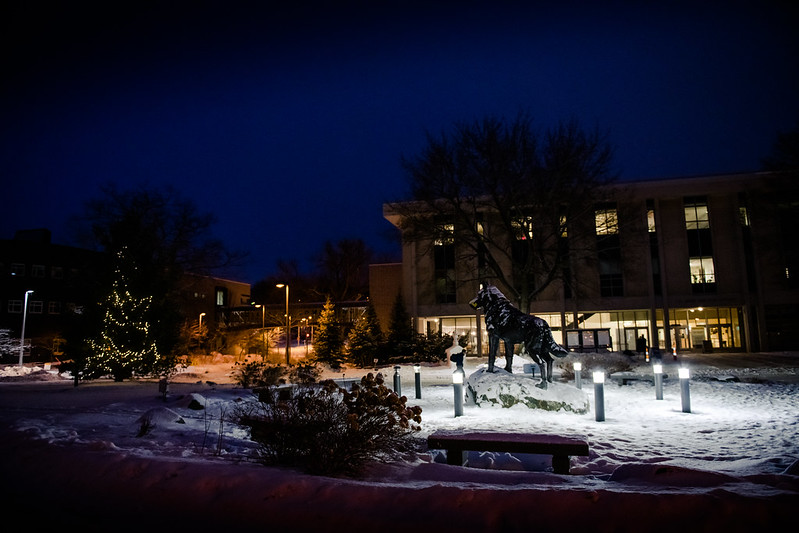
The Graduate School proudly announces the recipients of the Doctoral Finishing Fellowships for the spring semester, 2021. Congratulations to all nominees and recipients.
The following are award recipients in engineering graduate programs:

The Graduate School proudly announces the recipients of the Doctoral Finishing Fellowships for the spring semester, 2021. Congratulations to all nominees and recipients.
The following are award recipients in engineering graduate programs:
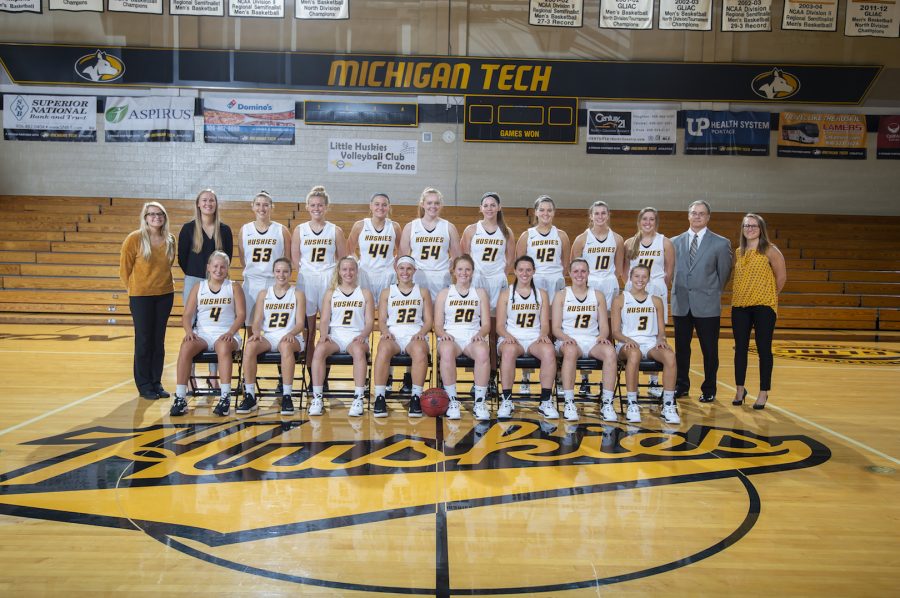
Three Michigan Tech Head Coaches and Athletic Director Suzanne Sanregret generously shared their knowledge on Husky Bites, a free, interactive Zoom webinar hosted by Dean Janet Callahan. Here’s the link to watch a recording of their session on YouTube. Get the full scoop, including a listing of all the (60+) sessions at mtu.edu/huskybites.
Ski – Score – Spike! What are you doing for supper tonight 1/25 at 6 ET? Grab a bite with Dean Janet Callahan and three fantastic head coaches for the Michigan Tech Huskies: Tom Monahan Smith (Nordic), Sam Hoyt (women’s basketball) and Matt Jennings (volleyball). Joining in will be Suzanne Sanregret, Michigan Tech’s Director of Athletics.
Student athletes at Michigan Tech are high academic achievers. How? What’s it like to be both an athlete and a student at Michigan Tech?
During Husky Bites, they’ll describe a day in the life of a Michigan Tech athlete, talk about recruiting, academic/mental wellness, and more—including how Michigan Tech athletes and (and their coaches) cope with COVID-19 challenges, too.
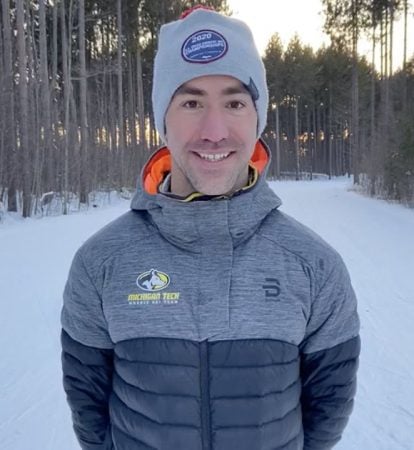
A native of Bend, Oregon, Monahan Smith came to Houghton after serving as the Head Postgraduate Program Coach of the Sun Valley Ski Education Foundation in Ketchum, Idaho.
Monahan Smith was a gold medalist in the freestyle sprint at the U.S. Junior Nationals in 2007 as well as being a six-time Junior All-American. He was also a prolific skier in high school, claiming the Oregon High School Nordic State Champion title three times. And he comes from a skiing family with his parents, brother, sister, and cousins all racing at the collegiate level.
Monahan Smith graduated from the University of Utah in 2013 with a bachelor’s degree in Environmental and Sustainability Studies and also a bachelor’s degree in International Studies.
Houghton-Bound: Tom Smith Hired as Michigan Tech Nordic Coach
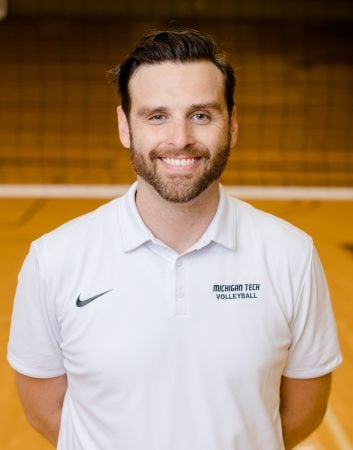
Jennings is also an instructor for the Department of Kinesiology and Integrated Physiology. He is currently teaching Sports Psychology and has taught various co-curricular courses for the department. He currently represents the GLIAC on the NCAA Regional Advisory Committee (RAC) for the Midwest Region and is a member of the American Volleyball Coaches Association.
Before making the move to the U.P., Jennings served as an assistant coach and recruiting coordinator at the University of Pittsburgh.
Jennings earned a bachelor’s degree in business administration and political science from Augustana College (Illinois) in 2003 and received his master of business administration (MBA) from St. Ambrose in 2006.
Jennings Hired to Lead Volleyball Program
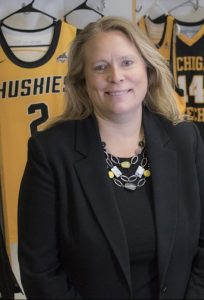
Her vision within the Huskies’ athletic programs and work on conference and national committees has positioned Michigan Tech as a leader in collegiate athletics.
A veteran of working within Michigan Tech athletics, Sanregret started in 1993 in the equipment room. She moved to business manager, then to compliance coordinator, and finally to assistant athletic director for business and NCAA compliance prior to taking over as athletic director.
Sanregret attended Michigan Tech and graduated in 1993 with a bachelor’s degree in business administration. She finished her master’s degree in business administration at Tech in spring 2006 and was inducted into the Michigan Tech Presidential Council of Alumnae in 2007. In March 2017, she completed her doctorate in higher education administration from the University of Phoenix.
Q&A with Diversity Award Winner Suzanne Sanregret
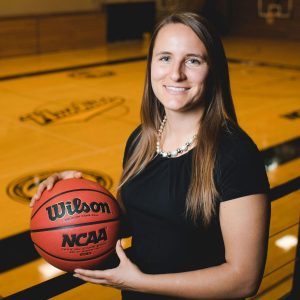
Hoyt returned to Michigan Tech from the University of Sioux Falls where she served as an assistant coach.
She earned a BS in Math at Michigan Tech in 2013. As a student, Hoyt was a standout player for the Huskies, helping lead the program to the 2011 NCAA Division II National Championship game as well as garnering multiple individual awards, including All-American Honorable Mention honors
I have been a basketball fan ever since I could walk! My dad was a coach growing up, so I was in the gym all the time. Our family is really competitive, so I loved that about basketball. I’ve also always had an inclination to help others learn and grow, and coaching basketball has given me the opportunity to develop a variety of areas in the young ladies lives that I get the pleasure to work with.
A: I was going to be a math teacher so I could coach basketball. All the coaches I knew growing up were teachers. Coach Barnes reached out to me about a graduate assistant position at Youngstown after I graduated from Tech, and I thought that was a great opportunity because all I really wanted to do was coach basketball. All the doors have opened for me, and I’m blessed with how it’s played out.
I was born and raised in Arkansaw, Wisconsin. I went to school at Michigan Tech and have now been coaching here for 3 years. I live about 5 miles from campus with my golden retriever, Remi. We love to go on hikes and enjoy the beauty of the UP!
#Believe
Coach Sam Hoyt, Michigan Tech
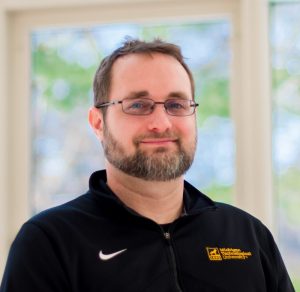
College of Engineering Dean Janet Callahan has selected Trever Hassell, Senior Lecturer in Electrical and Computer Engineering (ECE) for week two of the Deans’ Teaching Showcase. Callahan selected Hassell for his strong engagement of students in large classes. In one student’s words, he “has done an excellent job providing world-class teaching even in the midst of the pandemic and the shift to online learning. He continues to lecture on the important course material while trying out ideas to encourage student interaction outside of the lecture setting.”
For his large section remote course, Hassell has been adapting iClicker questions used in previous semesters (pre COVID-19) for use with Reef (or iClicker Cloud). Simultaneously, he has been expanding his question bank. Implementation of the iClicker Cloud software during the Michigan Tech FLEX initiative allows Hassell to engage and stimulate student learning during lectures and receive real-time feedback regarding whether students are mastering the learning objectives of the course. Lecture iClicker questions are posted prior to the lecture for students to review in advance. During the lectures the iCloud clicker app is used for polling students, taking a screenshot question on the lecture computer screen and sending it to the students’ Reef app or mobile device webpage. Students respond to the question and their information is provided in real-time to the instructor. Class response results are then viewed, shared, and discussed. Utilizing the iClicker Cloud software has also allowed for uninterrupted course participation even as students have had to switch from remote to face-to-face modes. “Using technology to engage students keeps the Zoom sessions productive, helping students focus on understanding the material”, said Dean Callahan.
Having more than eight years of experience with “online/blended” courses, Hassell continually refines his online delivery. It is no surprise that pivoting to the FLEX mode of instruction presented him with an opportunity, rather than a burden. He found that transitioning from a touchscreen laptop using the ZoomIt app, which had a granular screen annotation resolution limitation, to a Windows Surface Pro and annotating with Microsoft OneNote vastly improved the annotation resolution, increasing student engagement in virtual activity. Interim ECE Chair Glen Archer said, “Trever has always been an experimenter and early adopter in the classroom. He’s always on the lookout for new tools and techniques that will make life in the classroom better.” In addition, Hassell has made course structural changes allowing for greater flexibility in the weekly assignments, course participation, and exams addressing student accommodations under COVID. Hassell gives students a choice, allowing participation by either synchronous iClicker questions or asynchronous communications within lecture discussions. As another student noted, “His courses are always very neatly organized, and his posting of lecture notes before our Zoom lectures each week has certainly helped. Mr. Trevor Hassel also encourages much-needed discussion both during and outside of lecture.”
Hassell has actively taken advantage of professional training and development opportunities. The Center for Teaching and Learning (CTL) has been a vital resource and asset for information and advice. Attending several of the CTL’s lunch and learn workshops played a key role in helping him integrate available tools and strategies into the classroom environment. And students appreciate it. As another student commented, “Being in Mr. Hassell’s class in Power Electronics has been a very enjoyable experience. He was always available and even though I took the class in the middle of the pandemic, I felt like we were in the same room with him all along.”
Hassell will be recognized at an end-of-term event with other showcase members, and is also a candidate for the CTL Instructional Award Series (to be determined this summer) recognizing introductory or large-class teaching, innovative or outside the classroom teaching methods, or work in curriculum and assessment.

Grab some dinner with College of Engineering Dean Janet Callahan and special guests at 6 p.m. (ET) each Monday during Husky Bites, a free interactive Zoom webinar, followed by Q&A. Have some fun, learn a few things, and connect with one another as Huskies and friends. Everyone is welcome!
Husky Bites Spring 2021 series kicks off this Monday (January 25) with “Ski – Score – Spike! Student Athletes at Michigan Tech,” presented by three head coaches: Tom Monahan Smith (Nordic), Sam Hoyt (women’s basketball) and Matt Jennings (volleyball). Joining in will be Suzanne Sanregret, Michigan Tech’s Director of Athletics. They’ll be talking about the tremendous quality of our student athletes, recruiting, academic/mental wellness, share a day in the life of an athlete, and tell us how they cope with COVID-19 challenges, too.
“We created Husky Bites for anyone who likes to learn, across the universe,” says Dean Callahan. “We aim to make it very interactive, with a ‘quiz’ (in Zoom that’s a multiple choice poll), about every five minutes. Everyone is welcome, and bound to learn something new. Entire families enjoy it. We have prizes, too, for attendance.”
The series features special guests—engineering professors, students, and even some Michigan Tech alumni, who each share a mini lecture, or “bite”.
This spring, topics include Backyard Metals, Cybersecurity, Enterprise, Fishing, Music, Lake Superior, the Mackinac Bridge, Migratory Birds, Snow, Sports, Stents, and Volcanoes.
During Husky Bites, special guests also weave in their own personal journey in engineering, science and more.
Have you joined us yet for Husky Bites? We’d love to hear from you. Join Husky Bites a little early on Zoom, starting at 5:45 pm, for some extra conversation. Write your comments, questions or feedback in Chat. Or stay after for the Q&A. Sometimes faculty get more than 50 questions, but they do their best to answer them all, either during the session, or after, via email.
“Grab some supper, or just flop down on your couch. This family friendly event is BYOC (Bring Your Own Curiosity).”
Dean Janet Callahan
Get the full scoop and schedule at mtu.edu/huskybites. Check out past sessions, there, too. You can also catch Husky Bites on the College of Engineering Facebook page.
I have always been interested in building things — long before I knew that was called “engineering.” I don’t recall when I became fascinated with space but it was at a very early age. I have embarrassing photos of me dressed as an astronaut for halloween and I may still even have an adult-sized astronaut costume somewhere in my closet — not saying. The desire to explore space is what drives me. Very early in my studies I realized that the biggest impediment to space exploration is propulsion. Space is just so big it’s hard to get anywhere. So I dedicated my professional life to developing new space propulsion technologies. There is other life in our solar system. That is a declarative statement. It’s time that we find it. The moons of Jupiter and Saturn hold great promise and I’m determined to see proof in my lifetime.
Prof. Brad King, Mechanical Engineering-Engineering Mechanics
I loved watching a beautiful image of planet Earth, one with a very clear sky and blue water, during my high school days. However, as I began to learn how life on Earth suffers many difficult environmental problems, including air pollution and water contamination, I also learned that environmental engineers can be leaders who help solve the Earth’s most difficult sustainability problems. That is when I decided to become an engineer. In my undergraduate curriculum, the water quality and treatment classes I took were the toughest subjects to get an A. I had to work the hardest to understand the content. So, naturally, I decided to enter this discipline as I got to know about water engineering more. And then, there’s our blue planet, the image. Water makes the Earth look blue from space.
Prof. Daisuke Minakata, Civil and Environmental Engineering
I was born and raised in the City of Detroit. I went to Detroit Public Schools, and when I went to college I had to work to make ends meet. I got a job as a cook in the dorm, and eventually worked my way up to lead cook. I was cooking breakfast for 1,200 people each morning. One of my fellow classmates was studying engineering, too. He had a job working for a professor doing research on storm waves and beaches. I had no idea I could be hired by a professor and get paid money to work on the beach! I quit my job in the kitchen soon after, and went to work for that professor instead. I had been a competitive swimmer in high school, and the beach was where I really wanted to be. When I graduated with my degree, having grown up in Detroit, I went to work for Ford. I have to thank my first boss for assigning me to work on rear axle shafts. After about two months, I called my former professor, to see if I could come back to college. My advice for students just starting out is to spend your first year exploring all your options. Find out what you really want to do. I had no idea I could turn a mechanical engineering degree into a job working on the beach. Turns out, I could—and I’m still doing it today.
Prof. Guy Meadows, Mechanical Engineering, Great Lakes Research Center
I first became interested in engineering in high school when I learned it was a way to combine math and science to solve problems. I loved math and science and thought that sounded brilliant. However, I didn’t understand at the time what that really meant. I thought “problems” meant the types of problems you solve in math class. Since then I’ve learned these problems are major issues that are faced by all of humanity, such as: ‘How do we enable widespread access to clean energy? How do we produce sufficient amounts of safe vaccines and medicine, particularly in a crisis? How do we process food products, while maintaining safety and nutritional quality?’ As a chemical engineer I am able to combine my love of biology, chemistry, physics, and math to create fresh new solutions to society’s problems. One thing I love about MTU is that the university gives students tons of hands-on opportunities to solve real problems, not just problems out of a textbook (though we still do a fair number of those!). These are the types of problems our students will be solving when they go on to their future careers.
Prof. Rebecca Ong, Chemical Engineering
My Dad ran a turn-key industrial automation and robotics business throughout most of my childhood. In fact, I got my first job at age 12 when I was sequestered at home with strep throat. I felt fine, but couldn’t go to school. My Dad put me to work writing programs for what I know now are Programmable Logic Controllers (PLCs); the ‘brains’ of most industrial automation systems. Later, I was involved with Odyssey of the Mind and Science Olympiad. I also really liked these new things called ‘personal computers’ and spent quite a bit of time programming them. By the time I was in high school I was teaching classes at the local library on computer building, repair, and this other new thing called ‘The Internet’. A career in STEM was a certainty. I ended up in engineering because I like to build things (even if only on a computer) and I like to solve problems (generally with computers and math).
Prof. Jeremy Bos, Electrical and Computer Engineering
The factors that got me interesting engineering revolved around my hobbies. First it was through BMX bikes and the changes I noticed in riding frames made from aluminum rather than steel. Next it was rock climbing, and realizing that the hardware had to be tailor made and selected to accommodate the type of rock or the type or feature within the rock. Here’s a few examples: Brass is the optimal choice for crack systems with small quartz crystals. Steel is the better choice for smoothly tapered constrictions. Steel pins need sufficient ductility to take on the physical shape of a seam or crack. Aluminum cam lobes need to be sufficiently soft to “bite” the rock, but robust enough to survive repeated impact loads. Then of course there is the rope—what an interesting marvel—the rope has to be capable of dissipating the energy of a fall so the shock isn’t transferred to the climber. Clearly, there is a lot of interesting materials science and engineering going on!
Prof. Erik Herbert, Materials Science and Engineering
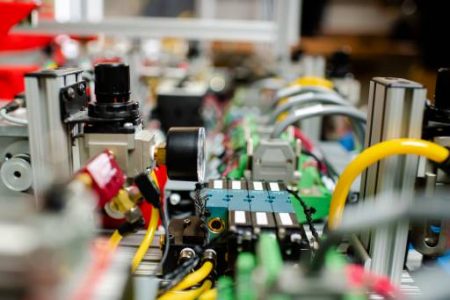
Michigan Tech recently launched a year-long Career and Technical Education (CTE) program for high school juniors or seniors in the area of Mechatronics. The new CTE Mechatronics program is offered through a partnership between Michigan Tech and the Copper Country Intermediate School District (CCISD).
Mechatronics uses electromechanical systems, typically automated for the design of products and processes. Industry 4.0—sometimes called the “fourth industrial revolution”—applies various aspects of mechatronics to manufacturing enterprises. Topics in the CTE Mechatronics program include; automation, computer integrated manufacturing, high speed manufacturing, embedded systems design and controls, industrial robotics, pneumatics, hydraulics, and computer-aided design.
“Students in the program will find careers in smart manufacturing fields, or they can find a pathway at Michigan Tech into undergraduate or graduate degrees in Engineering Technology, Engineering, or Mechatronics.” says John Irwin, chair of the Department of Manufacturing and Mechanical Engineering Technology.
Teaming up to deliver the instruction are faculty in the Mechatronics, Electrical and Robotics Engineering Technology (MERET) program in the College of Computing, and faculty in the Manufacturing and Mechanical Engineering Technology (MMET) Department in the College of Engineering.
There are 10 students enrolled this fall 2020 from the local area school districts of Houghton, Hancock, Calumet, and L’Anse. CTE Director Shawn Kolbus expects the program to only increase in popularity. “Local business owners approached us last year wanting to get more students from the area interested in Mechatronics, CADD and Engineering,” he says. “The result was the Mechatronics program which encompasses standards from each area.”
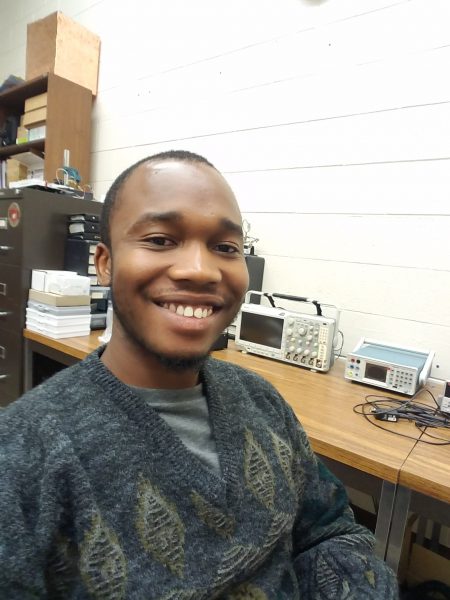
The course is taught by two mechatronics professionals who possess both industry and teaching experience. One of those instructors is George Ochieze, who is pursuing a master’s degree in Mechatronics and a PhD in Mechanical Engineering at Michigan Tech. “Even in difficult times during the pandemic, these young scholars show overwhelming potential to conquer the mechatronics field—a glimpse into a welcoming future in engineering,” says Ochieze.
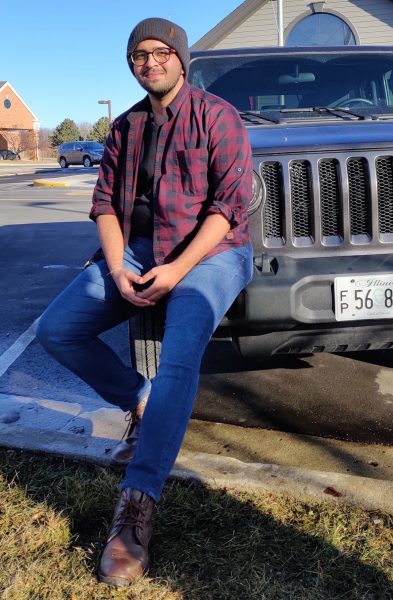
The second instructor, Chinmay Kondekar, will earn an MS in Electrical Engineering at Michigan Tech in 2021. “Teaching for local schools is an opportunity for me to give back to people in the community who welcomed me as an international student,” says Kondekar. “I hope to create a strong interest in robotics and automation in my students. People with these skills will be the future of manufacturing and will have plenty of opportunities.”
Program enrollment is closed for 2020, but will be available again starting in fall 2021. This spring there will be the opportunity for area sophomore and junior students to visit Michigan Tech to tour the labs and meet the instructors. Both the Applied Computing and MMET department labs used at Michigan Tech are equipped with state-of-the-art electronics and mechanical systems partially provided through generous startup funding from the CCISD.
For more information please contact Shawn Kolbus, Director, Career and Technical Education, Copper Country Intermediate School District (906) 250-5353.
Michigan Tech faculty administering the CTE program include Prof. John Irwin, Chair of the Department of Manufacturing and Mechanical Engineering Technology, or Prof. Alex Sergeyev in the College of Computing.

Ready to propel your career forward in 2021? Michigan Technological University’s College of Engineering now offers 16 new online graduate certificate programs. Interested in taking a course soon? Spring 2021 instruction begins on Monday, January 11.
“One of our goals at Michigan Tech has been to expand online learning opportunities for engineers, to help them meet new challenges and opportunities with stronger knowledge and skills,” says Dr. Janet Callahan, Dean of the College of Engineering.
The certificates are offered by four departments within the College of Engineering at Michigan Tech: Civil and Environmental Engineering, Mechanical Engineering-Engineering Mechanics, Biomedical Engineering, and Geological and Mining Engineering and Sciences. Several more engineering departments will join the effort in the near future.
“We have many more certificates in the works,” Callahan says. “We expect to have a total of 30 new online graduate certificates—including more than 90 courses online—by Fall 2021.
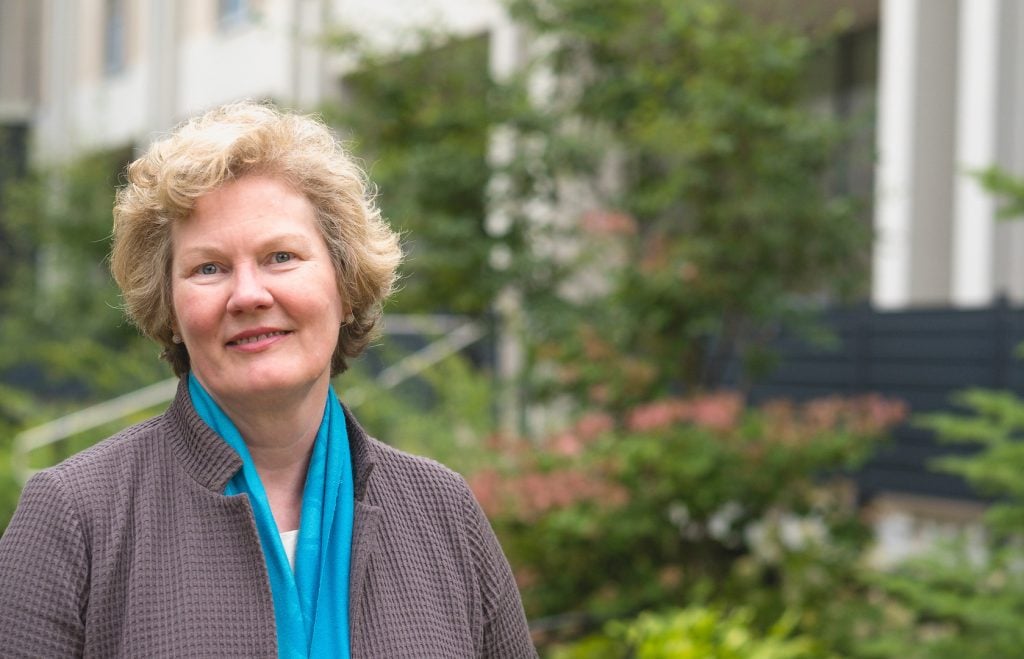
Students can sign up for a single course without committing to a certificate. “The courses are accessible and flexible to accommodate a busy schedule,” Callahan explains.
“These are the same robust courses taken by our doctorate and masters candidates, taught directly by highly regarded faculty, with outstanding opportunities to create connections,” she adds. “We invite working professionals to join these courses, and bring their own experiences to bear, as well as their challenges as part of the discussion.”
All courses will be taught online—many of them synchronously offered—with regularly-scheduled class meeting times.
Obtaining certification from Michigan Tech in sought-after industry skills is a great way to accelerate and advance a career in technology, Callahan says. Students take a cluster of three courses to earn a certificate. “It’s a three-step approach for a deeper dive into the subject area that results in a credential.”
Michigan Tech was founded in 1885. The University is accredited by the Higher Learning Commission and widely respected by fast-paced industries, including automotive development, infrastructure, manufacturing, and aerospace. The College of Engineering fosters excellence in education and research, with 17 undergraduate and 29 graduate engineering programs across nine departments.
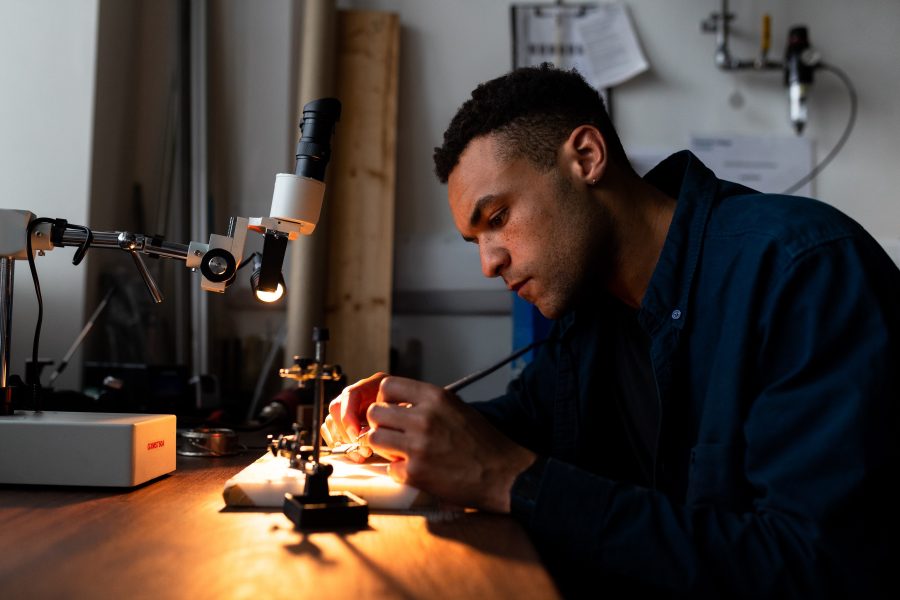
Michigan Tech faculty are accessible, offering an open door learning experience for students.
“We have a strong, collegial learning community, both online and on campus,” notes Callahan. “We’re also known for tenacity. Our faculty and graduates know how to deliver and confidently lean into any challenge.”
Michigan Tech’s reputation is based on those core strengths, Callahan says. “A certificate credential from Michigan Tech will be respected across many industries, particularly in the manufacturing sectors of the Midwest—and around the world. Michigan Tech engineering alumni are working in leadership positions across the United States and in 88 different countries.”
“Remember those ‘aha’ moments you had, back in your undergrad days, your backpack days, when things suddenly came together? It’s exciting, invigorating and fun to learn something new.”
Dean Janet Callahan, Michigan Tech
“Registration doesn’t take long,” she adds. “We have simplified the graduate application process for working professionals. You can apply online for free.”
Interested in taking a course soon? Spring 2021 instruction begins on Monday, January 11.
Need more time to plan? Consider Fall 2021. Instruction begins on Monday, August 30, 2021.
Learn about all graduate programs at Michigan Tech, both online and on campus, at mtu.edu/gradschool.

In the words of Michigan Tech alumna Erin Murdoch, now an automation engineer at Kendall Electric: “I can’t think of anyone more deserving.”
Gretchen Hein is the recipient of a major award from the world’s largest advocate and catalyst for change for women in engineering and technology. During ceremonies held online earlier this month on November 5, 2020, Hein was honored by the Society of Women Engineers (SWE), with the SWE Outstanding Advisor Award.
Hein is a senior lecturer in the Department of Manufacturing and Mechanical Engineering Technology and has served as the SWE Academic Advisor at Michigan Tech for the past 21 years. She teaches thermodynamics, fluid mechanics, and first-year engineering courses. She joined the faculty after earning her PhD in Environmental Engineering at Michigan Tech.
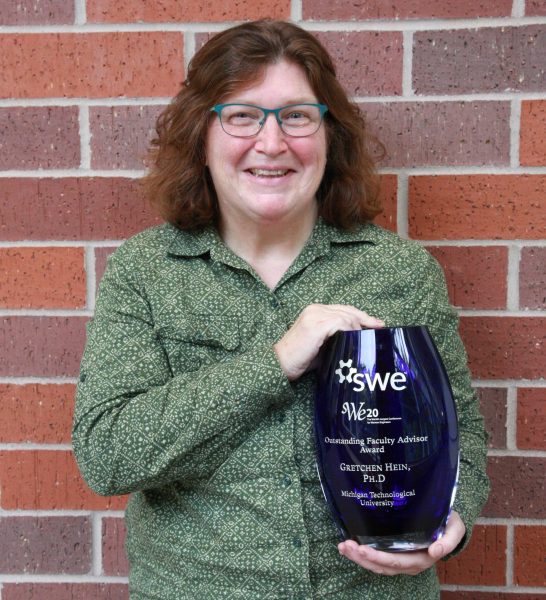
When I was 5 years old, I wanted to be a garbage collector because they let us ride through the neighborhood on the back of the truck. That’s also why I wanted to be a farmer—after haying, we were allowed to ride on top of the hay back to the barn. Later, when watching the Apollo Missions, I wanted to be an astronaut, riding on a spaceship. I said so at school, but it was the 1970’s. I was told by teachers and other adults, not my parents, that girls could not be astronauts. No woman had done that before. Being stubborn, I stuck with wanting to be an astronaut.
In high school, I took all the drafting classes my high school had to offer—mechanical and architectural drafting. I loved them. I wanted to be an architect. I read books on Buckminster Fuller, Frank Lloyd Wright and IM Pei. During my senior year, my dad, a mechanical engineer, said I should look into mechanical engineering, so I did. It sounded like fun.
I applied to General Motors Institute (now, Kettering University) and interviewed at Allison Gas Turbine Division. Working in a plant that made helicopter engines felt a little like “astronaut” and “architect” combined. I was sold. I began working there two weeks after my high school graduation. After earning my degree in mechanical engineering, I stayed on as a project engineer until I left for graduate school.
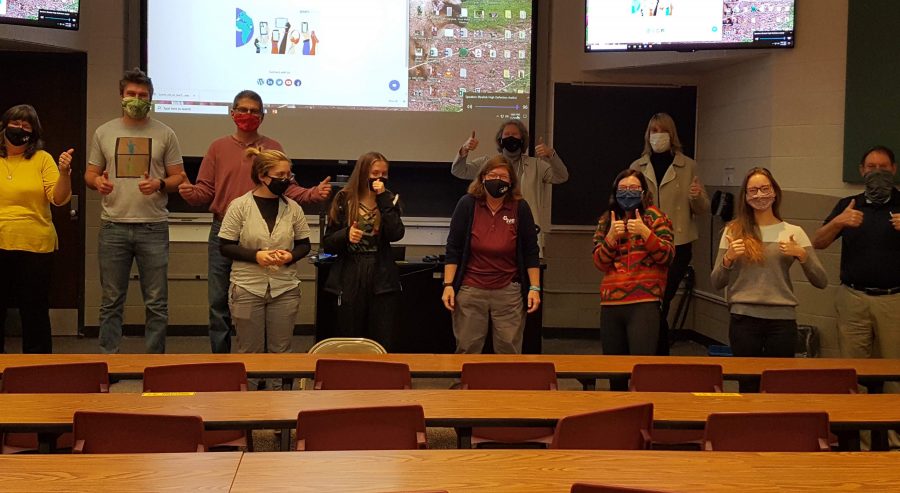
I was asked to be the SWE advisor when Dr. Sheryl Sorby became the first chair of the Department of Engineering Fundamentals, in 1999. I was new to teaching and unsure of the time commitment involved, so I talked with my colleague, MaryFran Desrochers, and we decided to be SWE co-advisors. We shared advising until 2005 when MaryFran left to spend more time with her family. She returned to campus when her girls were older and now works for Michigan Tech Career Services.
These days there are three SWE advisors: I am in the College of Engineering; MaryFran is our SWE liaison with Career Services, and Elizabeth Hoy at the Great Lakes Research Center helps us manage SWE finances. Our section counselor is alumna Britta Jost, New Product Introduction Manager at Caterpillar Inc. and member of Michigan Tech’s Presidential Council of Alumnae. I’ve always thought that the section was very strategic in choosing their advisors and counselor. We all work together well.
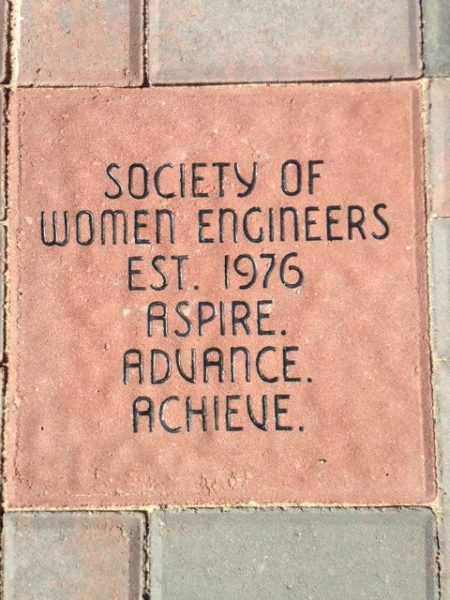
Over the past 20 years, my advising style has evolved and grown. At the beginning, I observed. As I learned what the section valued and where their interests were, I began to make suggestions. That’s how SWE’s annual Cider Pressing tradition began at my farm. Students wanted an event outside, and they wanted to meet my sheep, alpacas, ducks, chickens, dogs, cats, bunnies, rats, geckos and bees. Now, it’s the most popular social fall event where over 60 SWE members and friends come, press cider and meet the animals.
Michigan Tech members started to become active nationally in SWE. As I watched them grow, I felt that I needed to join them. I learned, through the students, that we can grow, expand our skills, and contribute, even by “standing in the background.”
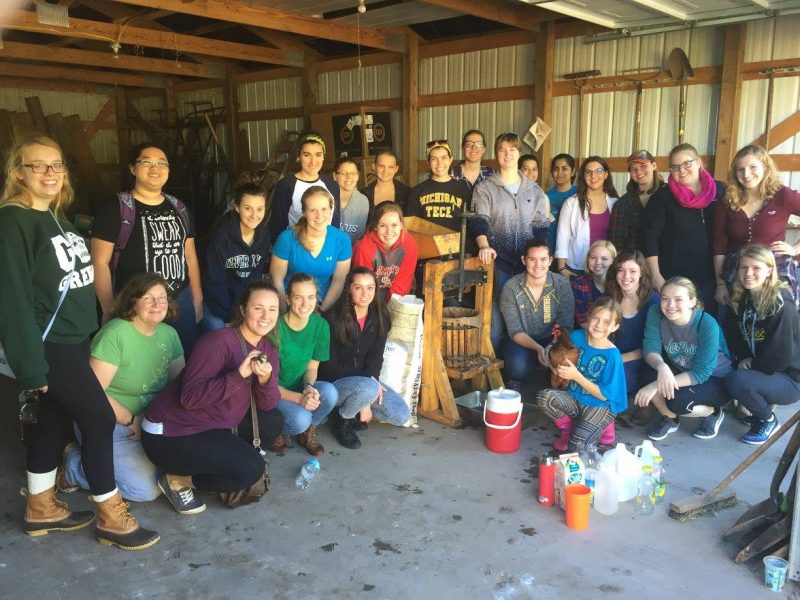
One of the reasons I chose Michigan Tech for my doctoral studies was because of the friendliness of the faculty and students. It is still a strong characteristic of Tech. The number of women students, along with faculty, has increased over the past 20 years. There are more opportunities and different areas of study in engineering now. As time has passed, people who were less accepting of differences have left, and those who are interested in diversity and inclusion have become leaders.
The grit and independence of our SWE members haven’t changed. The students are still people who enjoy working, collaborating and learning together.
The students—hands down! And this includes our graduates. For example, at WE19, I saw Anne Maher (a former SWE section president and member). It was like one of those sappy movies where two people run towards each other. I was so excited to see her and meet her mother. I get the same feeling in the fall when I see our students return to campus. I love to hear how their summer went, where they worked, what they did and what they will be doing at Tech. I always try to attend our fall Ice Cream Social, where we all meet new members. They bring so much excitement to the organization. It’s great to learn where they went to high school and why they came to Tech.
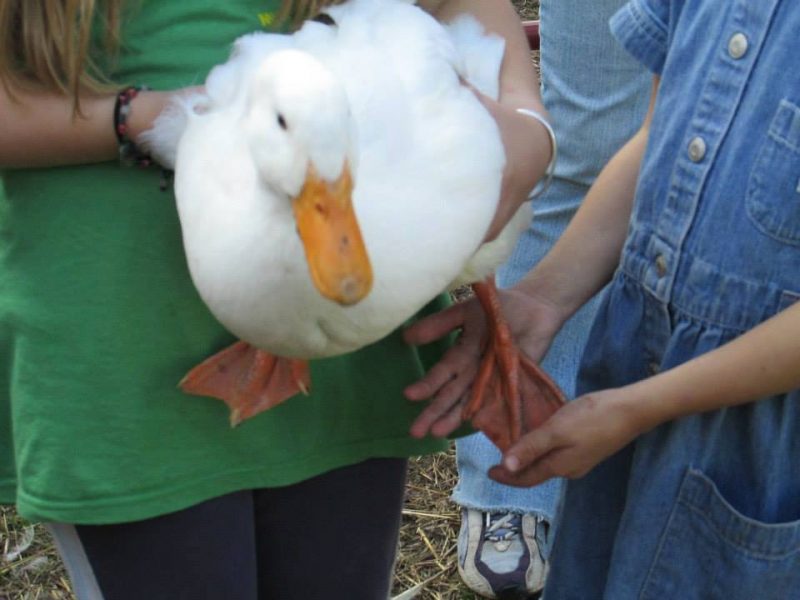
My happiest time is reconnecting. Every time I attend a SWE conference, I see so many of our graduates. Frequently, they recall “Duck Day” when I bring a duck into ENG3200, Thermodynamics/Fluid Mechanics. It’s a fun day because students get to pet, hold and see a duck. It’s a learning day because the arteries and veins in the ducks’ legs exchange heat to help regulate the duck’s body temperature.
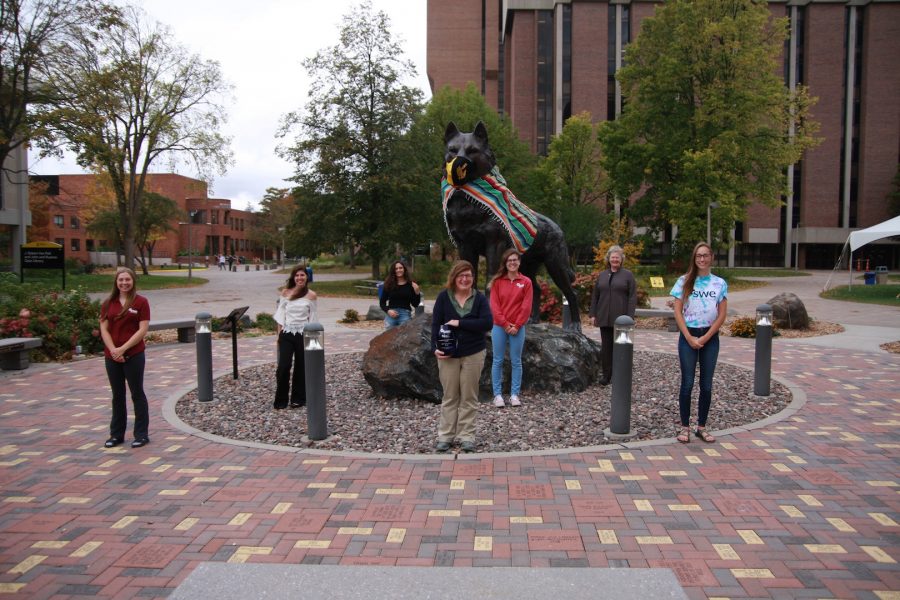
The students make Michigan Tech. They motivate me. Like most people with doctorates, I had taken no classes on how to help others learn. My goal was to create a classroom environment that encouraged learning and discussion. At first, I did not succeed, but I really wanted to be the type of instructor where students came to class, enjoyed the class and learned—probably in that order. I kept talking with the Jackson Center for Teaching and Learning (CTL) at Michigan Tech. I was one of the first instructors to use online videos and blended learning. My students had told me that they were willing to learn material outside of class if we worked through more problems in class, so I learned how to make my course more efficient, to gain that extra time. I began to tell stories in class about my family, my industrial projects, TED talks—anything that would grab their interest and keep them laughing and thinking. I focused on how the course material could be applied to their careers; I invited former students to come talk about their careers in class. Last but not least, I related how much I struggled with Thermo when I studied it in college.
“Dr. Hein is supportive of her students and does her best to ensure each of us have all the tools and resources to flourish, both academically and professionally. She teaches valuable life skills for navigating the professional world as a female engineer, and serves as an exemplary role model.”
Erin Murdoch ’17
For me, this question is personal. My son will be graduating in the spring with a degree in electrical engineering from Michigan Tech.
My advice is this: Find what you enjoy and do it, but realize that there will be times when the job is not exciting or that the challenges seem insurmountable. When visiting companies and during the interview process, see if you can visualize working with the people and in that environment. Each company has its own personality and so do you. You want these to mesh well. Figure out what type of community you’re happy in. It’s much easier to go to work when you like where you’re at. Use your contacts and resources.
I encourage everyone to keep learning and exploring, both at work and personally. The great thing is that sometimes growth in one area results in growth in another.
The SWE section at Michigan Tech values outreach. And their commitment to SWE continues long after they graduate. Many are involved in their professional section and at the national level.

Members of the local SWE section are holding a thank you letter-writing campaign to show Dr. Hein appreciation for all of the hard work she has put in to help it succeed, and to congratulate her on her award. Send your letters to us here, at this address.
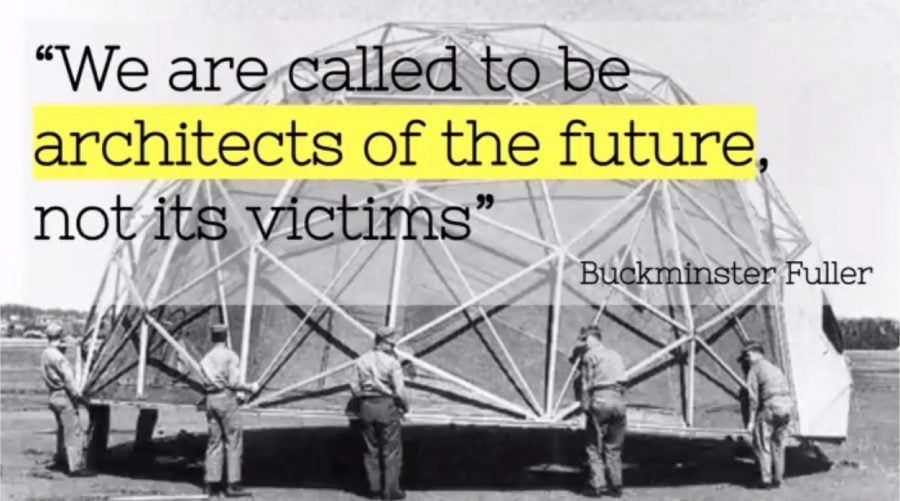
Mary Raber and Brad Turner generously shared their knowledge on Husky Bites, a free, interactive Zoom webinar hosted by Dean Janet Callahan. Here’s the link to watch a recording of her session on YouTube. Get the full scoop, including a listing of all the (60+) sessions at mtu.edu/huskybites.
What are you doing for supper this Monday night 11/2 at 6? Grab a bite with Dean Janet Callahan and Mary Raber, Chief Doing Officer of IDEAhub, Michigan Tech’s collaborative working group for educational innovation. Joining in will be Brad Turner, one of Mary’s former students, who earned his BS in Software Engineering 2017. He started his career at Handshake SF and recently joined Blackfynn Philly.
In this Husky “bite” you will be introduced to how Michigan Tech is using design thinking to reimagine education for the 21st century, and how Brad has used the process in his work after graduation.
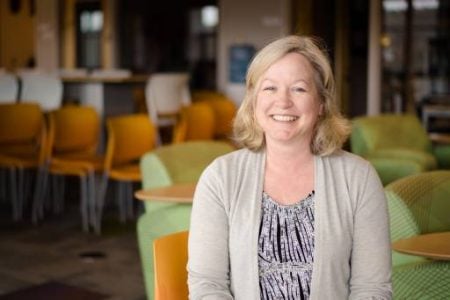
A professor of practice, Raber serves as assistant dean for academic programs in Michigan Tech’s Pavlis Honors College. She’s also co-director of Husky Innovate (Michigan Tech’s resource hub for innovation & entrepreneurship). A design-thinking and innovation enthusiast, Raber loves to help others embrace the tools and mindsets of innovation to effect positive change.
While earning his software engineering degree at Michigan Tech, Brad Turner joined the Pavlis Honors College. He worked as student coordinator for the Innovation Program within the PHC Innovation Center for Entrepreneurship, and that’s when he met Raber. “Mary became my mentor,” he said.
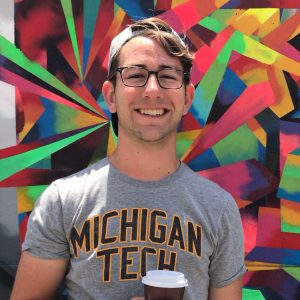
Nowadays, Turner is a product designer, one who recently made the switch from building tools that help college students find jobs, to designing software that improves the treatment of neurological diseases.
During Husky Bites, Raber and Turner will introduce the design thinking process, developed at the Stanford d.school.
“Design thinking is a tool to help you reframe life’s challenges into opportunities,” says Raber. “It’s a process widely used to solve messy, wicked problems,” she explains. “At its core is the human…those whose lives we are trying to improve in some way. The process fosters mindsets and skills that enables anyone, young and old, to tackle ambiguous problems.”
After a 14-year career in the automotive industry, Raber first joined Michigan Tech to lead the implementation and growth of the highly distinctive undergraduate Enterprise Program. She helped found the Pavlis Honors College, where she now facilitates learning in leadership, human-centered design, and lean start-up.
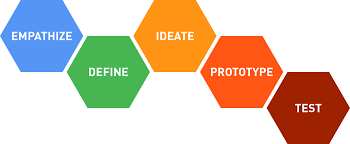
Raber was honored with Michigan Tech’s Faculty Distinguished Service Award in 2018. “Through Mary’s exceptional dedication and efforts, opportunities and resources for innovation and entrepreneurship on our campus have grown substantially,” said Lorelle Meadows, dean of the Pavlis Honors College.
Over the years Raber has co-founded several start-ups (“some of which have been successful, and some that haven’t fared as well,” she says). She’s currently pursuing a PhD at Michigan Tech with a focus on engineering education, and working on developing another start-up to help bring her passion for innovative teaching and learning to others.
“Design thinking is a tool to help you reframe life’s challenges into opportunities.”
Mary Raber
Raber has cultivated a strong relationship with the Stanford d.school, opening up additional avenues for student exploration and education. Through this collaboration, Michigan Tech has a highly active group of University Innovation Fellows (UIF).
“Fellows work to ensure that their peers gain the knowledge, skills and attitudes required to make a positive impact on the world,” Raber explains. “They attend training at Stanford’s d.school, where they can meet students from across the country engaged in change-making on their own campuses.” Michigan Tech’s UIFs engage with incoming first-year students during orientation week, exposing them early on to powerful entrepreneurial tools and resources.
Turner was a University Innovation Fellow during his years at Michigan Tech. He worked closely with Raber to develop and launch Michigan Tech’s first-ever makerspace, The Alley, located on campus in the Memorial Union Building. He facilitated design thinking classes, and developed a visual language for Alley.
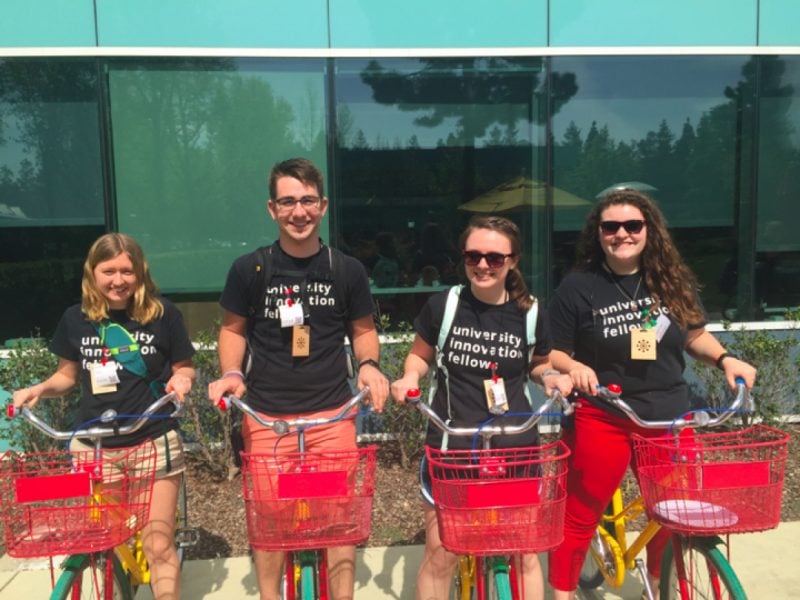
“I went through the (UIF) training with the Stanford d.school during my second year at Tech,” Turner recalls. “It was an 8-week online course where we learned about design thinking. “When I started working on more initiatives related to UIF, I found myself continually looking to Mary for advice, guidance, and support on those initiatives. By the time I graduated, Mary and I worked on a variety of projects together and presented our work together on campus and at national conferences.”
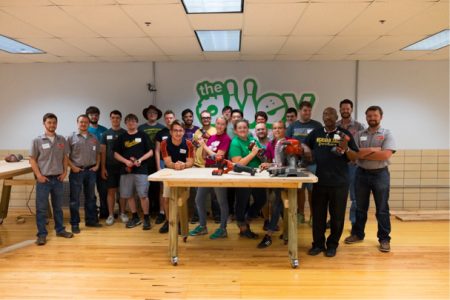
In 2014 Turner took an internship at Handshake, a company founded 2014 by three engineering students at Michigan Tech to give students access to a larger number of potential employers, no matter their location. Turner worked in the company’s first small office in Houghton, then moved with them to San Francisco for a second internship. Upon graduation he joined the company, helping grow its design system and processes as the Handshake team grew from 35 to over 200 employees.
As Handshake’s lead designer on a variety of projects, Turner collaborated with project managers to dig into challenges and articulate compelling problem statements. He conducted user research and user testing, and partnered with engineers to deliver high quality, accessible experiences.
Turner recently moved from Handshake to Blackfynn, a company that seeks to transform the treatment of neurological disease—including Parkinson’s disease, which affects nearly one million people in the US—with data-driven, next-generation therapeutics.

I enjoyed math, science and design in high school, so engineering seemed like a logical next step. My concentration was in biomechanics and I was hooked on the connections between health and engineering with my first internship at UMich hospitals where I tested hypodermic needles on cadavers. I was very fortunate to get my first job after graduation at Chrysler Motors working with an all female engineering team to design the sensing and diagnostics systems for the first mass-produced airbag systems. It’s led me to fascinating careers in automotive electronics and now engineering education.
I have lived in Michigan all my life, moving back and forth from lower Michigan to the UP several times. I’m easing into the empty nester life while my son lives nearby and attends Michigan Tech, and occasionally brings his laundry home. I love to travel and have had the opportunity to visit many wonderful places around the world. In my spare time I enjoy hiking, gardening, skiing, and creating through hobbies like baking, knitting, and quilting.
After watching too much Grey’s Anatomy in high school, I was sure that I wanted to be a surgeon when I grew up. I was also interested in technology, so instead of thinking about going to med school, I decided to study biomedical engineering to blend my interests in medicine and technology. (My interest in biomed only lasted a year before I discovered design thinking and decided to switch to software engineering).
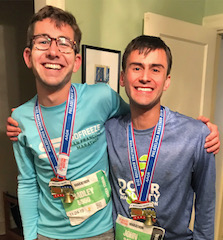
I grew up in Bay City, Michigan. My older brother was studying mechanical engineering at Michigan Tech and I really enjoyed Houghton when I came to visit him. After spending a weekend on campus with the Leading Scholars program during my senior year of high school, I knew it was the right place for me. I’ve spent the past 4 years in San Francisco and recently (during the pandemic) found a new home with my partner in Philadelphia. Outside of work you’ll normally find me running along the Schuylkill River, trying out a new recipe in my kitchen, or virtually volunteering to help get out the vote this November.

The Graduate School announces the recipients of the Doctoral Finishing Fellowships, KCP Future Faculty/GEM Associate Fellowship, and CGS/ProQuest Distinguished Dissertation Nominees. Congratulations to all nominees and recipients.
The following are award recipients in engineering graduate programs:
Profiles of current recipients can be found online.
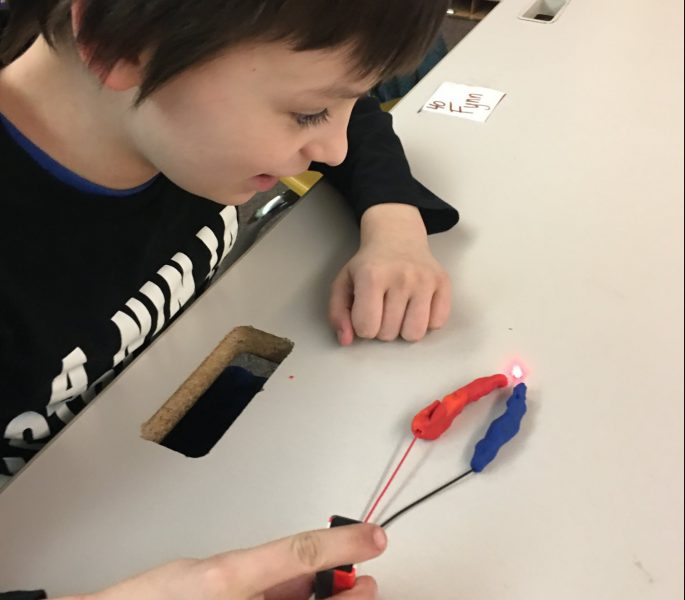
The Society of Women Engineers (SWE) at Michigan Tech make it their mission to give back to the community and to spark youth interest in STEM-related fields.
“We’re always looking for opportunities to grow and make new connections, both as an organization on campus and as a member of the community,” says Michigan Tech SWE section president and mechanical engineering major Katie Pioch. “We love getting kids excited about STEM.”
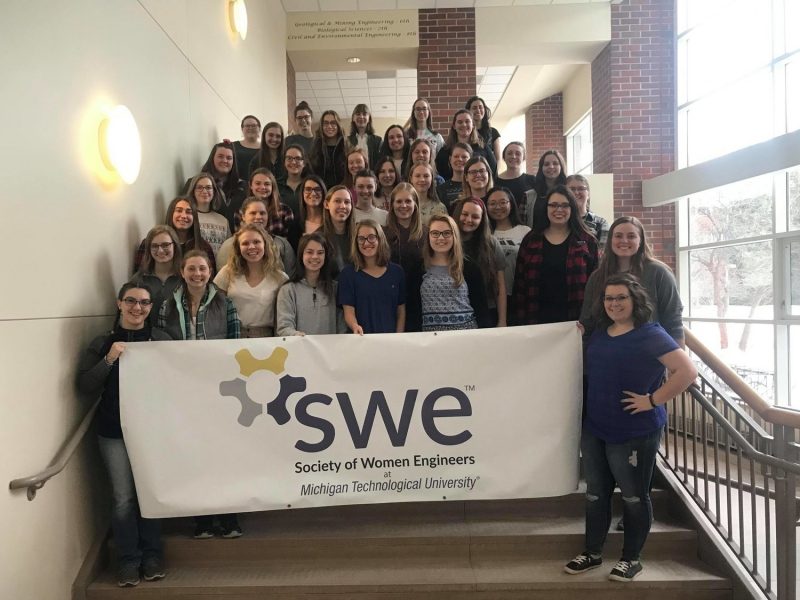
This past year, Michigan Tech SWE students helped high school students at Lake Linden-Hubbell Schools form the first-ever SWENext Club. They also mentored two eCYBERMISSION teams, sponsored by the U.S. Army Educational Outreach Program.
SWENext enables girls ages 13 and up to become a part of the SWE engineering community as a student through age 18. SWENexters have access to programming and resources designed to develop leadership skills and self-confidence to succeed in a career in engineering and technology. Although the program focuses on girls, all students are encouraged to get involved.

Students in the Michigan Tech SWE section worked closely with a team of 8th graders from Lake Linden Hubbell schools–Jenna Beaudoin, Chloe Daniels, Rebecca Lyons, and Olivia Shank–to develop three hands-on electrical engineering outreach activity kits for SWENext-age students and elementary students, too. The girls worked on the activity kits in conjunction with the eCYBERMISSION Competition sponsored by the US Army Educational Outreach Program, earning an Honorable Mention award for their efforts.
The activities: Play-Doh Circuits for upper elementary students, and Paper Circuits and Bouncy Bots for middle school students.
Play-Doh and Paper Circuits teach how parallel and series circuits work. Bouncy Bots involves a simple series circuit where a coin vibration motor—the kind used in cell phones and video game controllers—is connected to two 1.5 V batteries and adhered to a 4 oz medicine cup. When the circuit is operational, the device “bounces” across a surface.
Together with Michigan Tech’s Department of Electrical and Computer Engineering SWE students shared the activity kits with more than 400 students: regional Upper Michigan and Northern Wisconsin Girl Scouts; 5th-grade students at Calumet-Laurium-Keweenaw (CLK) schools; 4th-grade students at Hancock Elementary; and 5th-grade students at Lake Linden-Hubbell Schools.
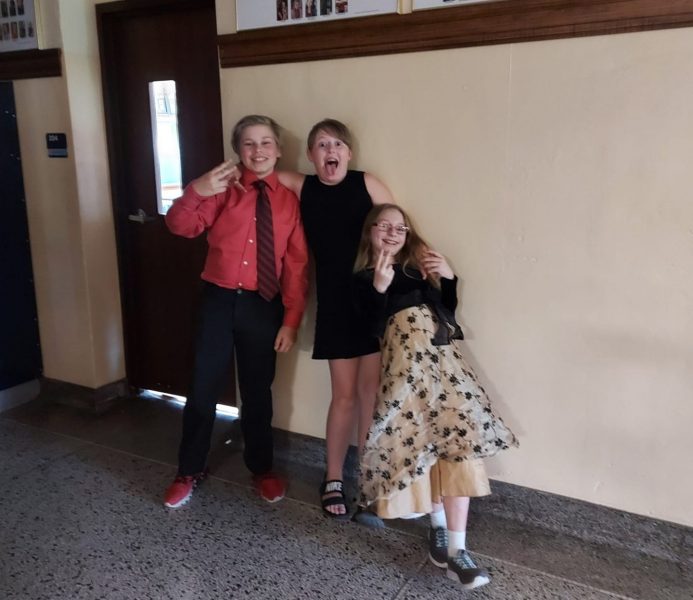
The Michigan Tech SWE section prepared two grant proposals, one for the SWE-Detroit Professional Section and the other for the Michigan Space Grant Consortium (MSGC), working closely with Michigan Tech’s ECE department. Both proposals were funded, enabling the students to create more activity kits and take them out into the local community.
The funding also allowed for the purchase of soldering tools, electronics components, and other supplies that will now be used to introduce an entire pipeline of students to electrical engineering topics.
High school students create heart rate monitor circuit boards, and also help mentor middle school students through the process of completing holiday tree boards. From there, high school and middle school students will be shown the Bouncy Bot activity; they will lead that activity for their school district’s elementary students.
“Both SWE and ECE are excited for this “trickle-down” mentoring program,” says Liz Fujita, academic advisor and outreach specialist for Michigan Tech’s Department of Electrical and Computer Engineering. Due to the pandemic, SWE members cannot go to area schools. Fujita plans to resume school outreach once the pandemic ends.
Michigan Tech’s SWE Section developed a video describing their year-long outreach projects for SWE’s national FY20 WOW! Innovation Challenge. A portion of the video was created by high school junior Jenna Beaudoin, founding member of the Lake Linden-Hubbell Schools SWENext Club. For their exceptional outreach efforts, SWE awarded Michigan Tech second place in the challenge.
Gretchen Hein, senior lecturer in the Department of Manufacturing and Mechanical Engineering Technology is Michigan Tech’s SWE faculty advisor. “We really encourage our SWE section members to develop professionally and personally,” she says. Students work especially hard on their annual Evening with Industry event, which takes place each fall during Michigan Tech Career Fair.” The event, held just a few weeks ago, was virtual. Sponsors included Nucor, Marathon Oil, John Deere, Amway, Milwaukee Tool, Corteva and CWC Textron.

Hein and a group of ten Michigan Tech SWE section members traveled to the annual WE19 Conference in Anaheim, California, the world’s largest conference for women in engineering and technology. They attended professional development sessions, participated in the SWE Career Fair, and networked with other student sections and professional members.
While there, Romana Carden, a major in engineering management, participated in the SWE Future Leaders (SWEFL) program. Carden also attended the day-long SWE Collegiate Leadership Institute (CLI) with Mackenzie Brunet, a fellow engineering management major. Both programs are led by female engineers working in industry and academia, to help college students gain leadership skills. Zoe Wahr, a civil engineering major, received a scholarship in recognition of her academic, university, and SWE accomplishments. And Hein was recognized at WE19 for her 20-plus years of service with the SWE Engaged Advocate Award, which honors individuals who have contributed to the advancement or acceptance of women in engineering.
“We have a strong and sustainable SWE chapter at Michigan Tech, and Dr. Hein’s work as the college of engineering chapter advisor has played a key role in this,” says Janet Callahan, Dean of the College of Engineering. “I am truly grateful to every person who has contributed to SWE—past, present and future.”
“In the coming year, SWE students plant to expand their outreach,” she adds. “We’d love to have more Michigan Tech students join the section and explore what SWE and the SWE members have to offer.”
Next month, in early November, the section will participate in the WE20 Conference in New Orleans, virtually.
Interested in learning more about the SWE section at Michigan Tech? Join their email list at swe-l@mtu.edu, or follow the section on Facebook and Instagram, @michigantechswe.